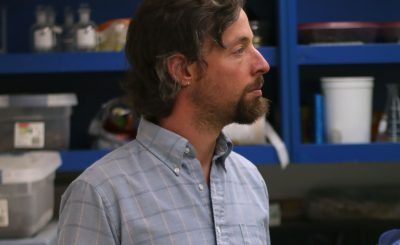“UWC is not a place where we impose a belief system on other people, but it’s not a place where you get to be comfortable.”
— Ben Gillock, Director – UWC-USA Agroecology Research Center and Environmental Systems and Societies Teacher
During Earth Week, UWC-USA Environmental Systems and Societies teacher, Ben Gillock, presented on the impact of eating meat. The “Meating,” as he billed the event, was not designed to convert people to become vegetarians or vegans. Instead, the goal of the Meating was to increase students’ understanding of the environmental impact of producing meat and to encourage everyone to make decisions based on science and fact. Each of his slides featured sources documenting the research supporting the data he presented.
Several of the takeaways from the presentation included:
- The leading causes of rainforest destruction are livestock and feed crops.
- According to researcher Dr. Richard Oppenlander, 82% of starving children live in countries where food is fed to animals, and the animals are then eaten by western countries.
- Growing feed crops for livestock consumes 56% of water in the U.S.
Ben suggested the following ways to eat meat more sustainably:
- Consider eating chicken or rabbit instead of beef, pork, or lamb.
- Raise meat yourself or learn how to hunt.
- Eat less meat – once per day is plenty.
- Be an informed consumer about the food you eat (not just meat) and the impact growing that food has on the environment.
In the end, Ben contends, it is a lifelong process to bring our values in alignment with the UWC mission. That can mean gradually making small changes to our habits or diets or attitudes knowing that incremental changes can have a big impact on us and our planet.

